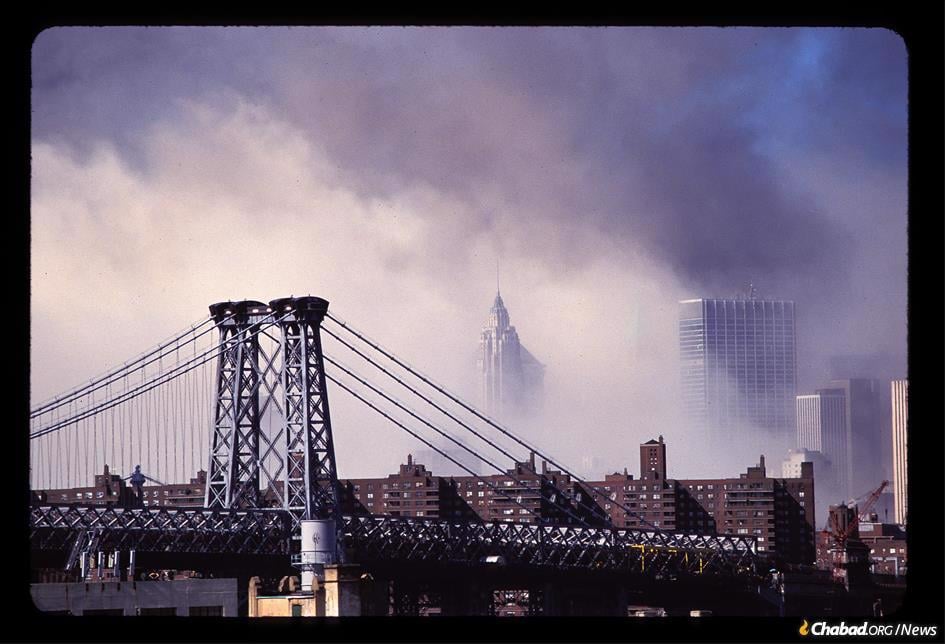The image is seared into my mind. Walking over the Williamsburg Bridge from Brooklyn to Manhattan in the early morning, looking to the right, and seeing giant plumes of smoke rising from the spot where the Twin Towers had stood just days before.
New Yorkers don’t generally talk to strangers. But everything was different in those days after 9/11. We were one city, one people. The fear had touched us all in a place that was deeper than race, socioeconomic status or culture. We were all humans in need of comfort.
My friend Dani and I crossed the bridge together with a cyclist. He told us that he was going away. He did not know where, and he didn’t care. He just needed to get out of New York to escape the terrible destruction that had happened there.
But we weren’t going far. It was the first day of Rosh Hashanah, and I was on my way to blow shofar for a small congregation of elderly retirees in Gramercy Park.
In my hand, I had a leather bag with a shofar inside of it. Since I did not yet own a shofar of my own (I was 18 at the time), I had borrowed one from my aunt and uncle. Its mouthpiece was riddled with tooth marks made by my overenthusiastic cousins, but it made a fine sound. I had spent a few hours in my dorm room practicing the day before, and I was sure that I would be able to blow it just fine.
I was accompanied by Dani, whom I had met in Russia the summer before, when we were co-counselors at the Chabad summer camp outside of Moscow. His parents were longtime refuseniks, and he knew Russian even though he had grown up in Israel. I, on the other hand, had learned a handful of words from my campers. Our common language was Hebrew, and we struck up a friendship (today, he is a Chabad emissary in S. Petersburg, and we still keep in touch).
And there we walked in the early dawn light, smelling the smoke of destruction and wondering how exactly the world would survive the new year, 5762.
When we arrived at the synagogue—a narrow affair sandwiched between walk-up apartments, Chinese laundries and convenience stores—we felt like we were sucked into a different era.
The once-grand but never large lobby bore fading photos of the congregation’s Hebrew school, none more recent than the 1970s, and the smell of musty carpets and aged books pervaded the building.
As we entered the sanctuary (according to a plaque on the wall it had been paneled in the 1950s), we saw perhaps a half-dozen men scattered throughout the room. Some pews were so covered with old books and pamphlets, there was no room to sit. Near the front sat the rabbi.
Wrapped in his tallit, the rabbi turned to greet us. He wore a white kittel with silver braid, the likes of which I had never seen before, which seemed to be nearly as old as he was. He wore his beard in a neatly kept goatee. Known in Yiddish as a komatz berdel, the style had been popular among rabbis decades before I was born.
“We don’t hurry on Rosh Hashanah,” he said in Yiddish, apparently apologizing for the weak showing. “By the time we are ready to start, we will have several dozen people here.”
He spoke with a grand confidence that meshed well with his strong Hungarian-Jewish accent. We soon learned that he had once been a well-known Yiddish radio personality and political activist who was famed for his oratory skills.
The rabbi began the service by belting out “Adon Olam” in a tune I had never heard before but which has stuck with me until this day. One by one, worshippers trickled in. I do not know if the rabbi’s “several dozen” ever materialized, but there was a motley crew of Jews—the men downstairs and the women above—mostly in their 70s and 80s.
After Torah reading, it was time for the rabbi’s sermon. He spoke powerfully about “the evil men who knocked down those towers,” assuring his congregation (and perhaps himself) that G‑d would surely bring them to justice.
It would be the rabbi’s first year not blowing the shofar himself, and he was not quite ready to give up his sacred duty. He stood with me at the bimah in the center of the sanctuary and read along with me the mystical prayers said by the shofar-blower.
After reciting the blessings, I closed my eyes and blew with all my might. I blew for the souls that had been cruelly snuffed out on 9/11. I blew for the congregation, wishing them another year of life and health. I blew for my generation, realizing that we were entering into an era when security was not something that we could ever take for granted. And I blew for G‑d, who saw mysterious beauty in the destruction and had a reason for the hammer-blow that had rammed into our world.
As we chatted with the congregants after services, it became clear that they were agitated and not very clear about what was happening just a few blocks away. “It’s that zero ground thing,” offered one woman, referring to the site of the attacks, which had been dubbed ground zero. “That’s why there are so few people in shul; they were scared away by that zero ground.”
There was a man in the synagogue from Brooklyn who was spending the holiday with his elderly mother in a nearby Beth Israel Hospital. He asked us to accompany him there to blow shofar for her and for another man who was in the hospital.
As we approached the hospital, we were greeted by walls covered with photocopied pages, each one with a photo, name, and brief description of an individual—a stark reminder of the terrible trauma that Manhattan was living through. People were still missing under the rubble, and family members were desperate for news.
We blew shofar for the two elderly people and shared a meal with their children. Homemade gefilte fish, sweetmeats and compote were a much-welcomed repast at that time of the afternoon.
Dani and I then spent the rest of the afternoon walking through the halls of the hospital, offering to blow shofar for any Jews who had not heard it. Along the way we met the Jewish chaplain, and he was happy to assign us certain floors, thus easing his burden.
We returned the following day for a repeat performance, and then remained in Manhattan until nightfall when we took a car service back home.
As we rode back to Brooklyn, the driver played the radio. For the first time since the attacks, there was more than just news updates. Ads, talk shows, the regular programming was coming back on air. It felt good to hear the usual irreverence of New York AM radio. It meant that we were still alive, still ourselves.
And with that, we were ready for the Jewish year of 5762.
















I am not Jewish, but ran across this article. From the comments, it looks like was published in 2018, though there is no date on the article itself. It is a wonderful remembrance of that day and so wonderfully written. Thank you for capturing your day - our day - such an important day...in history!